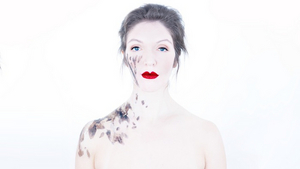Guest Blog: Alexandra Donnachie On WHEN WE DIED at the VAULT Festival

It's getting on for four years since I penned the first draft of When We Died, and as we approach our run at VAULT Festival, I find myself thinking about how the play has evolved, but also the team around it.
Once you have your play, your story, your sliver of something to share, you begin to build your team - but what happens when creativity alone is not enough? I know right; I too was shocked. It became abundantly clear very early on that if we were to tackle potentially triggering themes such as sexual violence and death in front of an audience, we were going to need help.
Last year, director Andy Routledge, producer Courtenay Johnson and I met with Serenity, a Northamptonshire-based organisation who provide a 24/7 support service for people who have been raped or sexually assaulted. Serenity have been incredibly supportive of the play and could not have been more generous with their time or expertise, having worked with hundreds of men, women and young people to help get their lives back on track in the aftermath of experiencing sexual violence.
We have also been working with artist and trainee (PhD) Forensic Psychologist Julia Langley, who has overseen the wellbeing of the creative team and audiences since before rehearsals began. Drawing on her work with both survivors and offenders of sexual assault, Julia brilliantly put together a Theatrical Trauma Report, which broke the play down and zoomed in on theory behind the behaviour of each character.
On the most basic level, the report provided us with a checklist to hold up against the play. Beyond that, the theories enabled us to unearth even more from our characters and story. A fresh take on a script you've been developing with the same team over almost four years is invaluable.
Through Julia's report and the conversations we had with Serenity, we were able to make strong links between the facts and statistics of our research and the fictional world of the play. This is a gift from a storytelling perspective, but potentially dangerous from a wellbeing one - something that was highlighted in Christina Fulcher's practice.
Christina's energy and dedication to both the play and safe practise is astounding. From a movement director perspective, Christina has helped create some incredible physical imagery for the play, but her experience as an intimacy director has allowed us to develop a language which meant we can see the choreography as something separate from what it might be connoting. As a performer, I can run the choreography and layer on any emotion later, meaning I'm less likely to sit in the darkness of the material outside of rehearsals.
Amongst all the potentially triggering content of abuse the play lives in, we have then had to address that our play deals with death - something else we might struggle to talk about!
It was harder to get in touch with an embalmer than it was to speak to people who worked with victims of sexual assault, but we managed it at the eleventh hour and that has been enlightening. I hope through the embalmer in our story we are able to show even a fraction of the passion that those we spoke to, read about and watched (there are a lot of videos available on the internet!) have for their job.
I have a deep appreciation for those who look after us at our lowest and most vulnerable moments in our lives. It has been a very humbling experience talking to those who have supported the play, and their guidance is hugely appreciated.
When We Died at the VAULT Festival 10-15 March
Videos
